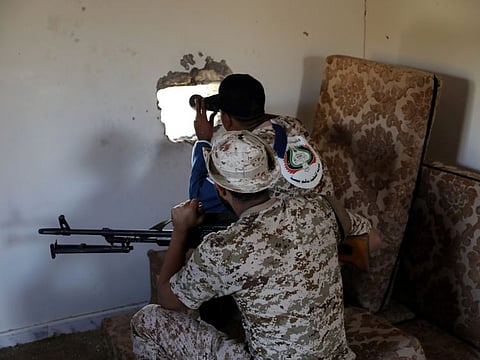Libya crisis needs an Arab solution
An Arab-led initiative can bring the parties back to the negotiating table

Away from the mainstream news a conflict is raging in Libya that needs urgent attention.
Extremist militias — backed by Turkey, Qatar and the Muslim Brotherhood — have gone haywire, wreaking havoc and threatening to tear the country apart.
The presence of such militias is a cause for deep concern to Arab states who would like to eradicate radical ideologies. Since the ouster and assassination of Libyan dictator Muammar Gaddafi in 2011, Libya has descended into chaos and tribal warfare. Because of this vacuum, Daesh was able to gain a foothold in the country until it was defeated by a United States-backed campaign.
However, the conflict has recently taken a dangerous turn with Turkey saying it was mulling sending troops on the ground to help stem an offensive on Tripoli, led by the Libyan National Army, to eradicate the capital of extremist militias. Much like what happened in Syria, with the interference of Iran, Turkey and Russia, Libya is fast turning out to be the next great battlefield. The lines have clearly been drawn with the LNA being backed by Russia and Egypt and receiving tacit support from the US, following a phone call between LNA commander Khalifa Haftar and US President Donald Trump earlier this year.
Arabs need to stand firm in denouncing any occupation of their lands...and they need to be wary of incursions such as Turkey’s invasion of northern Syria and the likely troop deployment in Libya.Gulf News
On the other hand, the Government of National Accord, led by Fayez Al Sarraj, is being supported by Italy, Turkey, Qatar and the Muslim Brotherhood. Military interference by Russia and Turkey, both non-Arab states, makes dialogue and mediation efforts more difficult.
What is needed is an Arab-led initiative to bring the parties back to the negotiating table to spare the country and its people from unnecessary bloodshed. The involvement of foreign actors only serves to complicate the situation even further. In fact, if the Arabs had taken the lead in Syria, instead of foreign powers, perhaps there could have been a lot less bloodshed. Of course, with Turkey, there is also the Arab worry that Ankara is seeking to expand its influence in the Middle East and return to the dark days of Ottoman domination. What is worse is that Turkish President Recep Tayyip Erdogan is a known supporter of the Muslim Brotherhood — outlawed by several Arab states — which has encouraged sectarianism in the Arab world.
The Arabs need to stand firm in denouncing any occupation of their lands, whether it comes from Israel, Iran or Turkey and they need to be wary of incursions such as Turkey’s invasion of northern Syria and the likely troop deployment in Libya.
Inaction could set a dangerous precedent — that there are no consequences for occupying Arab land.



